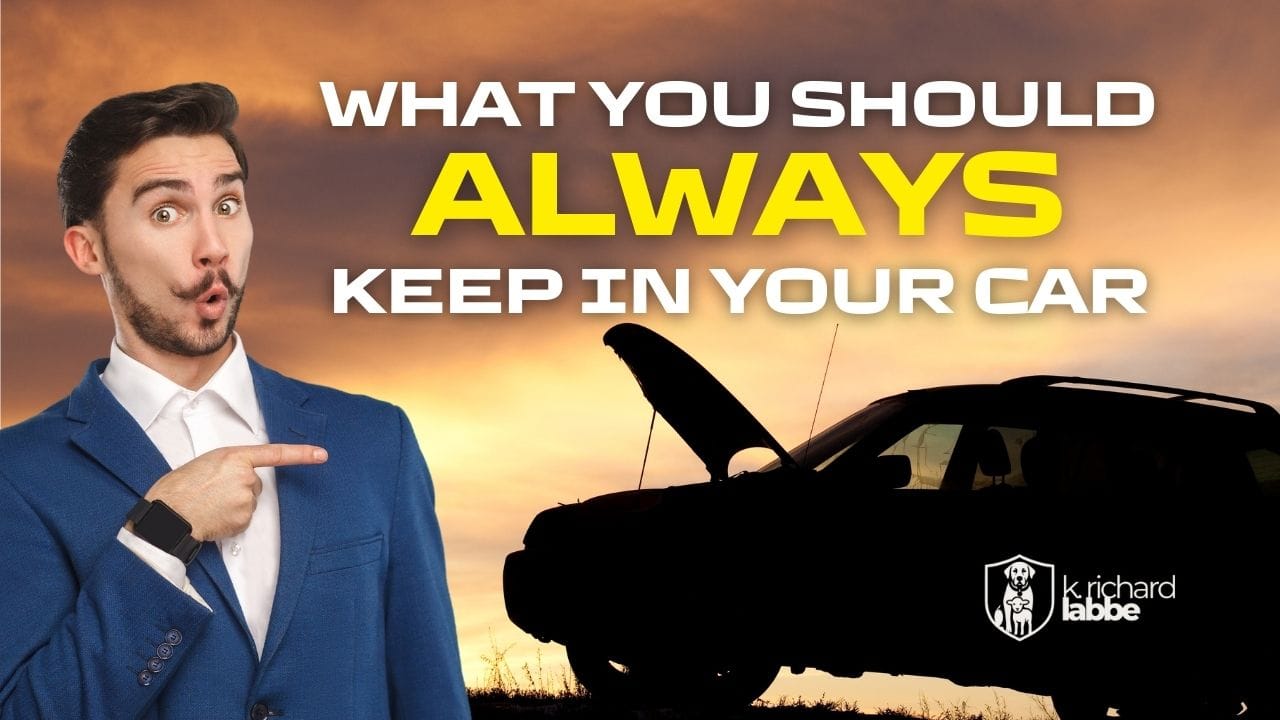What Should You Always Keep in Your Car?
You don’t need to turn your trunk into a hardware store. But keeping a few thoughtful items in your car—just in case—can turn a minor emergency into a manageable moment. It’s not just smart. It’s a quiet act of care.

Why This Matters
You’re not planning to break down.
You’re not expecting a flat tire, a dead battery, or a missed meal on the road.
But when it happens—when the unexpected shows up between errands, or during a family drive, or at 11:45 p.m. after a long day—being prepared makes all the difference.
That’s why we build margin into our gloveboxes and trunks. Not to live in fear—but to live with fewer regrets.
If you’ve ever said, “I wish I’d had…”—this list is for you.
The Essentials: What to Keep in Your Car at All Times
This isn’t an overstuffed checklist. It’s a carefully chosen group of items you can keep in a tote, small bin, or side compartment—ready when life gets bumpy, cold, or unexpectedly quiet.
1. Phone Charger (and Backup Battery if Possible)
If your phone dies, your options shrink fast. A charging cord (car-compatible) and, ideally, a portable power bank are the modern lifelines. Read our recommendation about the Goal Zero Venture Series!
2. Flashlight or Headlamp
Changing a tire in the dark—or checking house numbers on a rainy night—is no time to rely on your phone’s battery. Get one that runs on regular batteries and keep extras nearby. Here are some great options on Amazon (affiliate link).
3. First Aid Kit
Nothing fancy—just bandages, antiseptic wipes, pain relievers, allergy meds, and a pair of gloves. Enough to cover the moment until you get home or to urgent care. Looking for a first aid kit? Here are some options to consider (affiliate link).
4. Basic Tools
A screwdriver, tire gauge, multi-tool, or small wrench can come in handy more often than you think. Even zip ties or duct tape can buy time when something’s loose or flapping. Basic tool kits on Amazon (affiliate link).
5. Jumper Cables (or a Jump Starter Pack)
You may not use them often—but when you or someone else needs a jump, you’ll be the hero. A portable jump starter is a great upgrade for those who travel alone. Need jumper cables? Here is a page full of options (affiliate link).
6. Tire Repair or Inflation Kit
A can of Slime (affiliate link), Fix-a-Flat (affiliate link), or a small air compressor (affiliate link) won’t solve every tire problem—but they can get you safely to a shop without a tow.
7. Warm Blanket or Compact Emergency Blanket
Especially in colder regions or for long winter drives, a blanket can bring comfort in a breakdown, accident, or unexpected delay. This Arcturus Military Wool Blanket is an excellent and durable choice (affiliate link).
8. Non-Perishable Snacks
Granola bars, trail mix, or crackers keep surprisingly well in a car. When traffic drags or your day runs long, a small bite can restore patience and blood sugar.
9. Bottled Water (or a Refillable Jug)
Rotate periodically if it’s stored in heat—but having water on hand is useful in emergencies, long waits, or just basic hydration.
10. Paper Towels, Tissues, or Wet Wipes
Spills happen. So do sticky fingers, sick kids, and roadside messes. A small cleanup kit saves the day more often than you think.
11. Spare Cash and a Copy of Important Numbers
A small stash of emergency cash ($10–$40 in small bills) and a card with family contact info, insurance numbers, and roadside assistance details can help when your phone is dead—or missing.
12. Seasonal Extras
Depending on where you live:
- Ice scraper and gloves in winter
- Umbrella or rain poncho
- Sunshade and sunscreen in summer
- Bug spray if you’re rural or outdoorsy
You don’t need everything—but a little seasonal tailoring makes a big difference.
A Word for Families and Caregivers
If you’re caring for a parent or helping your teen learn to drive, building a simple car kit together can be a meaningful (and even fun) way to prepare them for independence. Let them help choose the items. Talk about why each one matters. It’s not just about gear—it’s about growing confidence.
And if your loved one is aging and still driving, this kind of kit can offer peace of mind for you both. Quiet readiness, tucked in the trunk.
Considering Doing This Today
- Grab a tote or sturdy bag and check your glovebox or trunk for what you already have.
- Add one missing item this week—no need to do it all at once.
- Keep everything low-profile and easily accessible (not buried under sports gear or groceries).
- Every season, take 10 minutes to swap out seasonal items and check expiration dates.
Conclusion
You can’t prevent every inconvenience. But you can stop many of them from becoming crises. You can be the calm in your own car—and sometimes, for someone else’s too.
A glovebox with a charger, a trunk with a flashlight, and a blanket in the backseat might not feel like much. But when you need them, they feel like a gift you gave yourself.
Prepared, not paranoid. That’s how we drive forward—one small safeguard at a time.
Stay safe. Be ready. Online and off.
Every effort has been made to ensure the accuracy and reliability of the information presented here. While Labbe Media, LLC strives to offer clear, well-researched guidance, this content is intended for educational purposes only and isn’t a substitute for professional advice tailored to your situation. We encourage you to use this material as a starting point—and to double-check details and consult trusted professionals when making important decisions.
